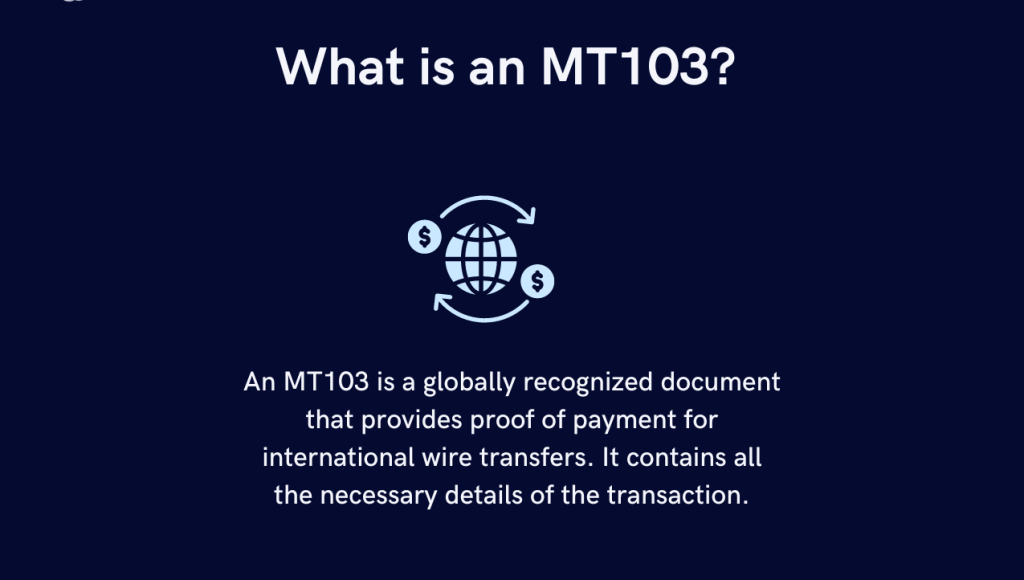What Is an MT103 Document? Everything You Need to Know
An MT103 document is a standardized payment confirmation used in SWIFT international wire transfers. It serves as official proof that a transaction has been processed, detailing the sender, recipient, transaction amount, currency, and banking institutions involved.
This document is widely accepted across global banking networks and can be useful for tracking payments, resolving disputes, or confirming receipt of funds.

When Do You Need an MT103?
Banks don’t automatically generate an MT103 for every transfer, but you can request one if needed. Common reasons to obtain an MT103 include:
- Proof of payment: If a recipient claims they haven’t received funds, an MT103 verifies the transaction.
- Dispute resolution: If there’s an issue with the payment, this document helps trace the transfer.
- Payment tracking: It shows the route of the money, including intermediary banks.
How to Request an MT103 Document
If you need an MT103 for an international transfer, you must request it from your bank. The process varies by institution, but typically involves:
- Contacting your bank through online banking, customer service, or visiting a branch.
- Paying a fee (banks may charge around £25 per document).
- Waiting for processing, which can take a few days.
Some financial platforms, like Cambridge Currencies, provide instant and free access to MT103s for completed transactions.
MT103 Fields Explained
An MT103 document includes various fields that provide transaction details. Here are the key ones:
| Field | Description |
|---|---|
| :20 | Transaction Reference Number |
| :23B | Bank Operation Code |
| :32A | Value Date, Currency, and Interbank Settled Amount |
| :33B | Original Ordered Amount |
| :50A, F, or K | Ordering Customer (Payer) |
| :52A or D | Ordering Institution (Payer’s Bank) |
| :53A, B, or D | Sender’s Correspondent (Bank) |
| :54A, B, or D | Receiver’s Correspondent (Bank) |
| :56A, C, or D | Intermediary Bank |
| :57A, B, C, or D | Beneficiary’s Bank |
| :59 or 59A | Beneficiary (Recipient) |
| :70 | Payment Reference |
| :71A | Details of Charges (BEN, OUR, SHA) |
| :72 | Sender to Receiver Information |
| :77B | Regulatory Reporting |
Alternatives to SWIFT Transfers
Traditional SWIFT transfers can take up to five business days, and banks may charge high fees. Alternative services like Cambridge Currencies offer faster, cheaper international transfers with real exchange rates and transparent pricing.
Final Thoughts
An MT103 document is an essential tool for verifying, tracking, and resolving issues related to international SWIFT payments. If you need proof of a transaction, you can request it from your bank—just be aware of potential fees and wait times.
For faster and more cost-effective global payments, consider modern alternatives that provide instant transaction tracking and lower fees.
MT103 Payment FAQs
What is an MT103 payment?
An MT103 is a standardized payment message used in the SWIFT system to confirm an international transfer. It includes all essential details of a transaction, such as the sender, recipient, amount, and financial institutions involved.
How do I get an MT103 from my bank?
To obtain an MT103, contact the bank that handled your international transfer. Request a copy of the SWIFT MT103 document, which serves as proof of payment. Some banks may charge a fee for this service.
What is the difference between MT103 and MT202?
MT103 is a customer payment instruction containing details about the sender and beneficiary. MT202, on the other hand, is used for interbank fund transfers and does not include detailed customer information.
How long does an MT103 transfer take?
Processing times for an MT103 transfer vary, but it usually takes one business day. If your transfer is delayed beyond 24 hours, you may request an MT103 to track the transaction.
Do banks charge for MT103?
Yes, most banks charge a fee, typically around $25, for providing an MT103 document. The processing time can take several days, depending on the institution.
